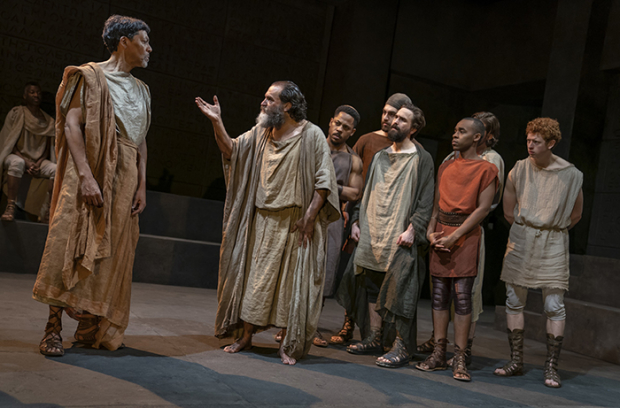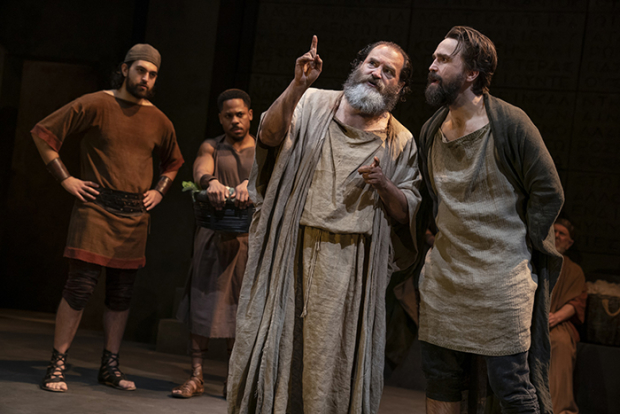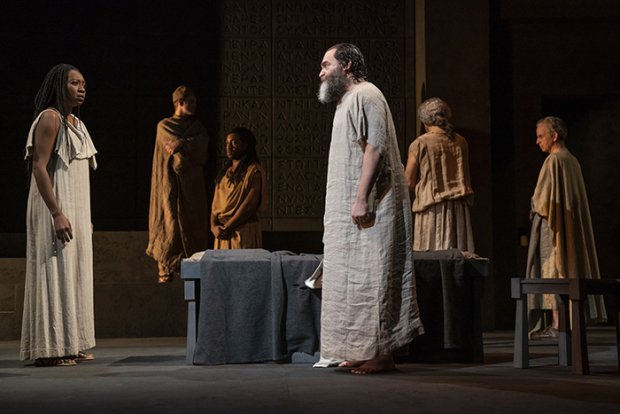Socrates Faces Off Against the Angry Mob of Democracy
Tim Blake Nelson’s new play follows Socrates from impiety to execution in ancient Athens.

(© Joan Marcus)
The experience of watching Tim Blake Nelson's Socrates — running at the Public Theater as part of the Onassis Festival — is comparable to the experience of sitting down to read Plato's dialogues: intellectually stimulating but dramatically inert.
Taking on the title role is Michael Stuhlbarg, who leads and antagonizes his supporting cast of toga-wearing men with authority and clarity (attractive costuming by Catherine Zuber, lit by Tyler Micoleau to invoke painter Jacques-Louis David's famous Death of Socrates). And perhaps the philosophy buffs among us will get a certain amount of delight out of watching Socrates needle Meno (Joe Tapper) about the definition of "virtue," or Gorgias (Tom Nelis) about the precise meaning of "rhetoric." But even as we watch this man's devotion to truth march him straight to his death, the Socrates we get onstage is no fuller than the sketchy one we get on the page.
The one on the page is the one created by his student Plato (played by Teagle F. Bougere) — although Socrates would apparently object to that label, "student," considering himself a knower of nothing and thus no teacher. He fittingly also wrote nothing, making Plato's writings our only access to Socrates's ideas, and leaving philosophers and historians alike to wonder how much of the Socrates character is really a reflection of Plato. Nelson gets to imagine some of the differences between them, putting the two head-to-head in debates over (what else?) the value of writing down Socrates's teachings, while showing Plato's mentorship of a young boy we can all but assume is Aristotle (Niall Cunningham), and whom Plato, unlike Socrates, unapologetically calls his student.
Beyond that, both Nelson's tedious dialogue and Doug Hughes's stilted direction feel overwhelmingly burdened by their source material. The story is framed around Plato and the "Boy" looking back on the events leading up to Socrates's execution (his voluntary ingestion of hemlock), the two of them examining what made Socrates's incessant questioning so blasphemous in democratic Athens. It's an investigation from which we could tease out plenty of modern-day grievances with democratic society: namely, how a democracy can quickly disintegrate into angry populism.

(© Joan Marcus)
We get that to a certain extent, watching a mob of Athenians made to look foolish by the famous Socratic method demand Socrates's head while illogically accusing him of both atheism and worshiping the wrong gods. Nelson, however, ultimately shies away from a full-throated challenge of democracy, even having the notoriously anti-democracy, pro-philosopher king Plato recuse himself from that very conversation, while the text of Pericles's pro-democracy funeral oration lines the walls of the theater (a striking display of 25 stone panels designed by Scott Pask).
A similar timidity comes through in Nelson's brief attempt to challenge Socrates's glorified intellect via his wife, Xanthippe (Miriam A. Hyman, giving the only three-dimensional performance in the entire production). Taking on the traits of a flesh-and-blood wife and mother (a creative license her character is gifted, in part it seems, because of an absence of historical information), Xanthippe counters her husband's airtight logic about why he should willfully accept his death sentence with persuasive arguments from a place of emotion — something Socrates consistently fails to consider.
For a moment, you wonder whether this entire exercise perhaps has been a way of turning Socrates's own logic against him. In a "democratic" society whose policies we see raucously debated by foolish men over gallons of wine, it would only be fitting for the sole woman in the room to be the great Socrates's most formidable challenger. And yet, she's ultimately ushered away as her husband plods toward his martyrdom in an unnecessarily drawn-out death scene. It's likely that Socrates himself would not endorse such unquestioned support for his actions, but as the thick etchings that envelop the audience for three hours should have warned us, it's difficult to challenge what's engraved in stone.

(© Joan Marcus)







